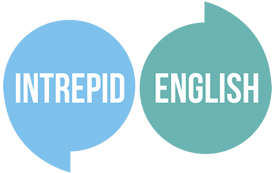Hello Intrepid English readers! Regular readers of our blog may remember that a couple of weeks ago we had a very exciting guest post from Patrick Bateman, host of the English Out LOUD podcast. Patrick and I also got together to record a podcast episode, which you can listen to right here! Today, Patrick is back with another really insightful blog post, where he shares his top tips for overcoming accent learning difficulties. Enjoy! You can also download the audio version on all good podcast apps.
From infancy, your brain began regularly absorbing information and using it to develop the skills needed to speak. This started by first learning what sounds to listen for, then repeating the mouth muscle movements required to produce that sound.
Children do this effortlessly, and for that reason, kids’ speech changes depending on where they live, who they live with, and what languages they’re exposed to. From 4 months until 13 years of age, this linguistic marvel gives us unbounded speech skills, but it gets much harder as we get older.
By the age of 13, your brain focuses on other developments, and your muscles solidify to move quickly and speak effortlessly. Your ears filter out unknown speech sounds, and your ability to reproduce new sounds fades.
After the age of 25, you’re an adult, your speech is fully developed, and you’re now beginning to recognize the real value of speaking many languages. As an accent coach, a common denominator between my students is that by the time they think to work on their accent, they’re already fully-grown adults!
Unless time travel is on your list of English-learning resources, nothing can be done about your age. The language filter learned through childhood, however, can indeed be understood and moulded to your own desire. Retraining your muscle memory requires commitment, but if changing your language skills is your goal, there are three elements of your language filter that I’d like to direct your attention to:
Sounds of your Native Language
There are sounds in your Native language that may not exist in English. Start by pinpointing what these sounds are, then identify when you use these sounds in your English speech. These sounds can be eliminated, if you choose, and replaced with other English sounds.
Next, consider what sounds are made in spoken English that do not exist in your native language. Learn to identify when to make these sounds, and repeat them countless times.
The English Out LOUD Podcast is a great resource for hearing important sounds of spoken English, and kick-starting your American accent learning progress!
Linking
Spoken English links words in a way which is not seen in written English. Practicing and understanding word linking is no walk in the park, but once you get the hang of it, you’ll find that your listening skills improve dramatically. Many people find they catch word combinations they may have missed otherwise.
Intonation
Intonation is the rise and fall of English speech; the factor that makes it sound bouncy. This bouncy sounding speech is imperative to your accent, as pronouncing strong sounds too soft, or soft sounds too strong may change a word’s meaning.
How can we overcome intonation difficulties? Start by picking a few short grammar words (of, a, can, the), to focus on how native English speakers say these. If you listen closely, you’ll notice their voice go quieter and quicker for these words. Nouns and verbs, on the other hand, are pronounced stronger, and louder. Spotting the differences of intonation is the first step to overcoming it.
Once you get the ball rolling on changing your spoken English, you’ll be looking at language learning in a whole new light. My free recommendation is to use the resources available to you to get things started. Use language apps, listen to podcasts, and repeat what you hear people say. Youglish is an incredible resource for that, as you can type in any English phrase, and listen to native speakers repeating it.
Paid services are extremely helpful as well, and truly kick things up a notch. A coach gives you feedback on how you sound and what changes you can make, and you practice them. Whatever level you strive for with your language learning is up to you, and us teachers are happy to help you get there.

This is Patrick Bateman, an American Accent coach from Canada, and thank you for reading!
If you want to learn more about what changes you’re capable of making with your American accent, check out Pat’s Instagram @en.outloud, and the English out LOUD Podcast on Buzzsprout, Spotify, Apple Podcasts, Audible, or any podcast player of choice.
Book a trial lesson today and talk about your learning goals with an experienced English teacher. Say goodbye to boring English lessons! If you’re not sure what you want to learn, let your teacher choose from the range of English courses that have been designed to help our students to achieve their goals.
If you have any questions, or you would like to request a topic for a future blog, you can contact us using the chat box, or email us at Intrepid English.
